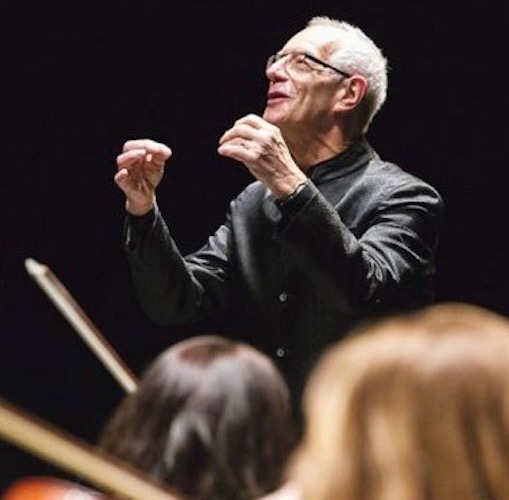Kraemer, MOB close season with the sacred, secular and spectacular
Nicholas Kraemer rang the curtain down on Music of the Baroque’s season Monday night at the Harris Theater. The vehicle was “Pulpit and Playhouse,” a typically enterprising Kraemerian program of rarities, both sacred and secular.
The two main works of the evening were of the former variety, with a pair of infrequently heard spiritual works by Bach and Handel. Both are early works, written in 1707 when the contemporary masters would each have been 22 years old.
Bach’s Cantata No. 131 “Aus der Tiefen rufe ich, Herr, zu dir” hails from Bach’s salad days as organist and choir master in Mühlhausen, before he took up his first major post in Weimar.
Written to mark a devastating town fire the previous year, Cantata 131 is a darkly reverential work scored for just eight players (string quartet, oboe, bassoon, bass and organ). Yet the dark grandeur of the music belies the modest forces, and Kraemer’s direction brought out the music’s gravitas and sense of spiritual progression.
Baritone Christopher Edwards was a solid if reserved soloist while Thomas Cooley’s vibrant tone and expressive rendering made the Arioso “Meine Seele wartet auf den Herrn” a highlight.
There is striking contrapuntal confidence displayed in No. 131, and skillful balancing by MOB’s principal guest conductor ensured that the vocal soloists, chorus, orchestra and instrumental lines all registered, with committed singing by the chorus throughout and superb oboe obbligatos by Anne Bach.
From the St. Blasius Church pulpit to the disreputable theatrical mountebanks of the playhouse, with Purcell’s masque, The Fairy Queen.
Kraemer offered a few choice selections from Purcell’s populist retooling of Shakespeare’s A Midsummer Night’s Dream, giving all five of the evening’s vocal soloists a moment (or two) in the spotlight.
More raffish theatricality would have been welcome at times with some of the soloists a bit too well-behaved in their opportunities.
Thomas Cooley brought the greasepaint sensibility most pungently in his animated “A thousand, thousand ways we’ll find” with the chorus. Countertenor Reginald Mobley delivered an insinuating and characterful “One charming night” in his mellifluous countertenor, sauntering through the orchestra as he sang.
Soprano Sherezade Panthaki handled the hushed dynamics and high tessitura of “See, even Night herself” with ease though greater theatrical involvement would have helped. Veronique Filloux brought a slender soprano and light sensual touch to “I am come to lock all fast” and good cheer to “Now the Night is chas’d away.” Baritone Edwards was an evocative nocturnal soloist in “Hush, no more.”
Rhythms could have been a bit more incisive at times, but Kraemer drew a lively response and wide dynamic range in Purcell’s music, with flexible choral singing and buoyant orchestra playing as needed.
Albinoni’s Concerto for Two Oboes was the odd piece out, with principal Anne Bach joined by Margaret Butler. While not exactly a work for the ages, the two soloists brought graceful unanimity of phrasing to the Adagio and polished playing to the cheerful bustle of the outer movements.
If one had the impression that the young Bach was testing the musical boundaries of 1707 in Cantata 131, then the 22-year old Handel seemed intent on detonating explosives with his Dixit Dominus.
There is a youthful audacity and mercurial brilliance in this work that almost seems to be pre-channeling C.P.E. Bach—jarring in a composer whose mature music is characterized by balance and formal rigor.
The five soloists all proved accomplished in the score’s challenges and their moments in the sun—particularly Mobley in his “Virgam, virtutis tuae” and the seamless blending of Panthake and Filloux in “De torrente in via bibet.”
But the young Handel reserves his flashiest moments for the chorus, and the MOB ensemble was clearly up to all the challenges hurled at them—from the leaping soprano lines of the opening title chorus to the soaring, majestic “Judicabit in nationibus.”
Most astounding was “Tu es sacerdos,” which proved a wild ride Monday night. Taken at a lightning tempo by Kraemer, the music suggested a hopped-up Baroque Gilbert and Sullivan. The MOB Chorus was dazzling here, delivering a spectacular rendition even at this speed.
That blazing Handel performance made an apt farewell for William Jon Gray who is retiring after nine seasons as MOB chorus director. The low-key Gray did a most impressive rebuilding job with the MOB Chorus, which was not at its peak when he came on the job in 2010.
A bass-baritone who always joined his singers onstage for performances—as he did again Monday night—Gray’s tenure was also notable for his intelligent and often dizzyingly eclectic programs (and fine conducting) at the Brass and Choral holiday concerts. His successor will have their work cut out for them to maintain the high standard set by Gray. MOB plans to employ guest choral directors for this coming season, which will serve as quasi-auditions for the post.
The concert opened with a “flash mob” of students from Music of the Baroque’s “Strong Voices” project. In addition to its important social and educational components, this choral arts education initiative, now in its third decade, is clearly paying off in in its tutelary mission as well. Over 240 students from six Chicago public high schools (Curie, Hubbard, Von Steuben, Senn, Lane Tech and Lindblom) filled the stage and front aisles of the theater, delivering an admirably polished rendering of—aptly—Purcell’s “Come, ye sons of Art,” led by Kraemer.
The concert was dedicated to Elizabeth Gottlieb, longtime MOB Chorus member and “Strong Voices” teaching artist, who passed away last month.
Music of the Baroque will present a gala fund-raiser, “A Musical Feast,” 6:15 p.m. May 31 at The Fairmont Chicago.
Music of the Baroque opens its 2019-2020 season with Jane Glover conducting Bach’s Mass in B minor September 14 and 15. baroque.org
Posted in Performances





